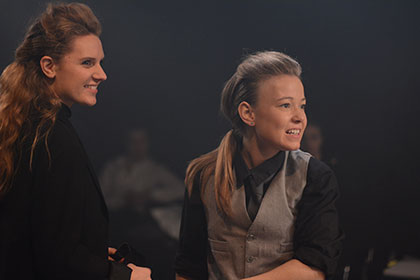Not all drama schools are the same. Susan Elkin takes a peek inside Fourth Monkey’s new premises to discover a communal hub with a strong vocational drive.
Stage smoke, sinister lights, shadow work, love, murder, a naked man, revenge, a castration, a female protagonist, glee, lust and much more. Welcome to the murky world of Fourth Monkey’s recent production of Thomas Middleton’s The Revenger’s Tragedy. It’s a play so violent that it can easily turn into farce but in the skilled, well-trained hands of these young actors and their director, Tom Espiner, it stays on course as a dark, compelling account of human nature at its worst.
Fourth Monkey Training Company moved to a former workhouse in Seven Sisters Road Tottenham last year. Renamed “The Monkey House” it is now beautifully converted with excellent studios for classes and rehearsals, a kitchen area in which students can mix socially, a quiet study room, costume department, prop store, office space and inspirational quotes sign-painted on every wall. It’s spotlessly clean because you have to leave your outdoor shoes in a locker near the ground floor door. The best bit is the top floor studio theatre where shows such as The Revenger’s Tragedy are staged. It’s a traverse space with audience seated, for the most part, in a single row around the perimeter so the action is almost televisually immediate.
Steve Green founded Fourth Monkey Training Company in 2011, because he wanted to provide a strong vocational alternative to three years in drama school. There’s an above average focus on classical drama. The other play in the recent 2016 repertory season alongside The Revenger’s Tragedy was The Winter’s Tale. In 2014 the company mounted a three play, highly acclaimed Marlowe season in Canterbury to mark the playwright’s 450th birthday.
So how does Fourth Monkey function as a training provider? It offers two training options, both based on performance and working in repertory. The Year of the Monkey is a one year, part time, opportunity which – at least in the first half of the year – allows time for the participants, aged 18 and over and sometimes people who have worked at something else for a long time, to work part-time to help fund themselves. Green and his colleague have seen doctors, nurses, city people and other professionals signing up, alongside school leavers and recent university graduates, because they want to try professional acting training with, perhaps, an eye to possible career change.
The two year course includes four repertory seasons and the year is divided into four terms during which everyone works for 40 hours per week or more. Some participants move on to the two year course after The Year of the Monkey which creates a three year training option. Fees are charged but, for the Year of the Monkey, they are lower than drama school tuition fees.
“We want our training to have a contemporary resonance for what the industry requires now, and for our actors to be industry-ready in two years, but the training also encourages them to develop the knowledge and ability to create work for themselves, something we see as essential and valuable to both the actor and industry itself.” Green told The Stage recently.
Teaching staff, most of them still active professional creators working in the performing arts industries, are brought in to guide, challenge, direct and train. And there’s a lot going on. “We are currently in pre-production for our 2017 collaborative project with The Marlowe Theatre, Canterbury on our ‘Two Kings’ season. This will be delivered with our graduate Ensemble Company following on from the previous successes of the touring ‘Elephant Man” explains Green. The latter was a project after Green’s own heart because he’d always planned, if he could get funding for it, to take an ensemble of Fourth Monkey graduates out on tour, thereby providing them with their first professional experience. He’s pleased, therefore, that the graduate Ensemble Company is also in development for a 2016/17 tour of a student created bursary award project Battle of Waterloo.
There’s nothing insular about Fourth Monkey either. “Our students are currently collaborating on projects whilst in training with the following companies: Shunt (delivering our first year devising production season on the Two Year Rep programme), Theatre Re, All-In Theatre (Edinburgh Fringe), Complicité and Told by an Idiot” says Green, adding that he is also developing a training strand in collaboration with Theatre Delicatessen for 2017.
And since the acquisition of The Monkey House, the short course and alumni programme of refresher and introductory courses has gone from strength to strength. “We are beginning to see The Monkey House fulfilling its objective of becoming an artistic ‘hub’ for the wider arts community and specifically our alumni for their continued development”, says Green.
Fourth Monkey certainly seems to have developed its own very specific way of working. There’s a film on its website in which students explain what they like about it. “I’ve learned that the real meaning of ensemble is nurturing each other” says one. Another mentions an “enclave feel” and several talk of community, networking, “a communal vibe” and learning from each other. Several praise the different rooms in the building and say they value the functions of the various spaces.
It’s all quite an achievement in a relatively short time and certainly goes to show that there are choices and that you can get good training without going to a traditional drama school. That’s, surely, why Fourth Monkey was shortlisted last year for The Stage’s School of the Year award. www.fourthmonkey.co.uk



